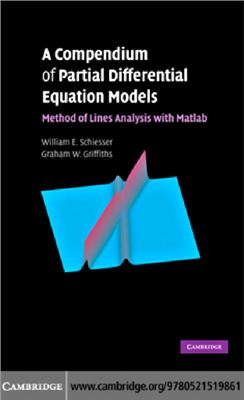Cambridge University, 2009. - 490 Pages.
A Compendium of Partial Differential Equation Models presents numerical methods and associated computer codes in Matlab for the solution of a spectrum of models expressed as partial differential equations (PDEs), one of the mostly widely used forms of mathematics in science and engineering. The authors focus on the method of lines (MOL), a well-established numerical procedure for all major classes of PDEs in which the boundary value partial derivatives are approximated algebraically by finite differences. This reduces the PDEs to ordinary differential equations (ODEs) and thus makes the computer code easy to understand, implement, and modify. Also, the ODEs (via MOL) can be combined with any other ODEs that are part of the model (so that MOL naturally accommodates ODE/PDE models). This book uniquely includes a detailed line-by-line discussion of computer code as related to the associated equations of the PDE model.
A Compendium of Partial Differential Equation Models presents numerical methods and associated computer codes in Matlab for the solution of a spectrum of models expressed as partial differential equations (PDEs), one of the mostly widely used forms of mathematics in science and engineering. The authors focus on the method of lines (MOL), a well-established numerical procedure for all major classes of PDEs in which the boundary value partial derivatives are approximated algebraically by finite differences. This reduces the PDEs to ordinary differential equations (ODEs) and thus makes the computer code easy to understand, implement, and modify. Also, the ODEs (via MOL) can be combined with any other ODEs that are part of the model (so that MOL naturally accommodates ODE/PDE models). This book uniquely includes a detailed line-by-line discussion of computer code as related to the associated equations of the PDE model.

